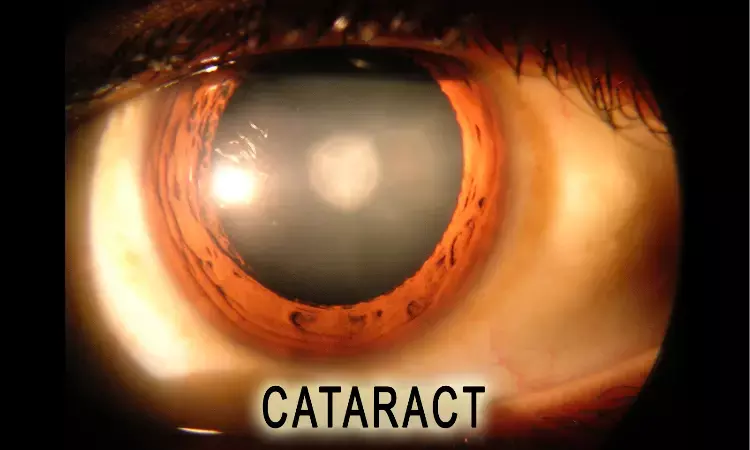- Home
- Medical news & Guidelines
- Anesthesiology
- Cardiology and CTVS
- Critical Care
- Dentistry
- Dermatology
- Diabetes and Endocrinology
- ENT
- Gastroenterology
- Medicine
- Nephrology
- Neurology
- Obstretics-Gynaecology
- Oncology
- Ophthalmology
- Orthopaedics
- Pediatrics-Neonatology
- Psychiatry
- Pulmonology
- Radiology
- Surgery
- Urology
- Laboratory Medicine
- Diet
- Nursing
- Paramedical
- Physiotherapy
- Health news
- Fact Check
- Bone Health Fact Check
- Brain Health Fact Check
- Cancer Related Fact Check
- Child Care Fact Check
- Dental and oral health fact check
- Diabetes and metabolic health fact check
- Diet and Nutrition Fact Check
- Eye and ENT Care Fact Check
- Fitness fact check
- Gut health fact check
- Heart health fact check
- Kidney health fact check
- Medical education fact check
- Men's health fact check
- Respiratory fact check
- Skin and hair care fact check
- Vaccine and Immunization fact check
- Women's health fact check
- AYUSH
- State News
- Andaman and Nicobar Islands
- Andhra Pradesh
- Arunachal Pradesh
- Assam
- Bihar
- Chandigarh
- Chattisgarh
- Dadra and Nagar Haveli
- Daman and Diu
- Delhi
- Goa
- Gujarat
- Haryana
- Himachal Pradesh
- Jammu & Kashmir
- Jharkhand
- Karnataka
- Kerala
- Ladakh
- Lakshadweep
- Madhya Pradesh
- Maharashtra
- Manipur
- Meghalaya
- Mizoram
- Nagaland
- Odisha
- Puducherry
- Punjab
- Rajasthan
- Sikkim
- Tamil Nadu
- Telangana
- Tripura
- Uttar Pradesh
- Uttrakhand
- West Bengal
- Medical Education
- Industry
Self-reported cataract surgery linked with all-cause and vascular mortalities: BMJ

Clinically significant cataract is associated with an increased risk of death from vascular causes, such as stroke and heart attack, suggests research published online in the British Journal of Ophthalmology.
Cataract surgery is the only effective treatment for cataract – a major cause of blindness and visual impairment – and consequently the most performed ophthalmic procedure. It can be used by researchers as a surrogate for clinically significant cataract.
Several studies have looked at the association between cataract surgery and mortality from any cause but have produced conflicting results, so the authors set out to investigate the association between cataract surgery and death by looking at deaths from specific causes.
The authors accessed data on 14,918 people aged 40 years or older who had participated in the 1999–2008 cycles of the National Health and Nutrition Examination Survey in the United States. This included 2,009 people (9.61%) who reported that they had undergone cataract surgery.
Deaths were tracked over a median follow-up period of 10.8 years during which 3,966 (19.1%) of the participants died. Death from all causes was more likely in people who had self-reported cataract surgery as were deaths from certain specific causes, including vascular disease, cancer, accident, Alzheimer's disease, respiratory disease and renal disease.
After taking into account a range of socioeconomic and health factors, only the association between self-reported cataract surgery and vascular-related mortality remained significant.
The risk of death from any cause was 13% higher in people who self-reported cataract surgery compared to participants who had not undergone the surgery, and the risk of death from vascular causes was 36% higher. No significant association was observed specifically between self-reported cataract surgery and cancer, respiratory disease, renal disease, Alzheimer's disease or accidents.
The authors suggest that oxidative stress, crystallins or depression may be the common factor linking cataract and greater risk of vascular death. Studies have shown that oxidative stress-induced DNA damage contributes to cataract formation and promotes atherogenesis.
Crystallins are major components of the lens and are also involved in regulating responses to stressors such as inflammation and ischaemia, the degeneration of crystallins which occurs in cataract may represent a more widespread disorder which contributes to the higher vascular mortality.
Patients with cataract have been shown to be more likely to develop depression than those without the condition, even after they had undergone cataract surgery, and people with depression are at higher risks of developing CVD.
This is an observational study, and as such, can't establish cause, and the authors also highlight several potential limitations. Self-reported cataract surgery was used as a surrogate for clinically significant cataract, which meant that some cataract cases could have been missed, and it was not possible to determine the type of cataract affecting patients and whether specific types of cataract were associated with deaths from specific causes.
Nevertheless, the authors conclude: "This study found significant associations of self-reported cataract surgery with all-cause and vascular mortalities. More studies are needed to confirm these associations and to further investigate the mechanisms behind these associations."
https://bjo.bmj.com/content/early/2021/09/27/bjophthalmol-2021-319678
Hina Zahid Joined Medical Dialogue in 2017 with a passion to work as a Reporter. She coordinates with various national and international journals and association and covers all the stories related to Medical guidelines, Medical Journals, rare medical surgeries as well as all the updates in the medical field. Email: editorial@medicaldialogues.in. Contact no. 011-43720751
Dr Kamal Kant Kohli-MBBS, DTCD- a chest specialist with more than 30 years of practice and a flair for writing clinical articles, Dr Kamal Kant Kohli joined Medical Dialogues as a Chief Editor of Medical News. Besides writing articles, as an editor, he proofreads and verifies all the medical content published on Medical Dialogues including those coming from journals, studies,medical conferences,guidelines etc. Email: drkohli@medicaldialogues.in. Contact no. 011-43720751


